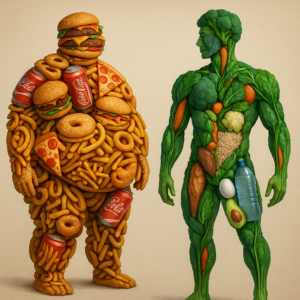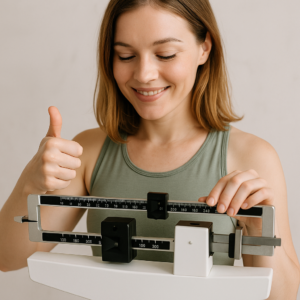4-Ways to Motivate Yourself to Lose Weight

Did you know that what you eat literally becomes your body? The food you ingest breaks down into elements that replace your body parts.
For instance.
- Every 28 days, your skin completely replaces itself
- Every 5 days, your stomach lining completely changes
- Your red blood cells completely replace themselves every 4 months
- Even bones regenerate every 7-10 years
It is important to spend time paying attention to what you eat. Do you want a body made up of donuts and cheesecake or meat and veggies? Because one will make you feel better and look better.

Mind over Matter
Equally as important: the media you consume becomes your mindset. In 1960, George Gerbner, a media researcher and professor, developed what’s now known as Cultivation Theory.
He found that people who spend more time-consuming certain types of media begin to view the real world through the lens of what they’ve watched—especially if those themes are repeated over and over again. (Source)
So if you’re constantly watching violent TV shows, your brain starts to perceive the world as more dangerous than it really is. If you’re always scrolling through filtered models, you may start to feel inadequate, even if you’re making great progress.
This isn’t opinion—it’s observable, studied, and peer-reviewed. Your mental “diet” shapes your beliefs, your fears, your values, and even what you think is normal.
Take my sister Sarah (name changed or she’d kill me). Sarah spends hours each day listening to murder-mystery podcasts, loves watching every murder show she can get her hands on, and the like. She spends all day with murder and intrigue in her ears.
As a result: what do you think pops into her head when she hears the house creek at night? How often has her husband had to walk around the house with a baseball bat to appease her nerves?
If her fears became too much, she could choose to consume different media with no murder.
This is an interesting and important point that most don’t consider.
If you have an attitude, emotion, or gut-feeling about something that you don’t want to have: look at what you’re feeding your brain. Just as what you feed your body replaces body parts, what you feed your brain replaces your attitudes and outlook.
What this has to do with Weight Loss
No one argues that what you feed your body is essential to weight loss. What people don’t understand: It’s equally important to feed your brain. What you input into your psyche will be your attitude. Do you want weight-loss longevity? Then you’ve got to pay attention to how you’re feeding your mindset.
Here are 3 tips to how you can better feed your brain to stick with your diet long term. With only 20% of people succeeding at sustained weight-loss, the mental aspect might be the most important.
1. Weigh in daily
Daily weigh-ins can be tricky because that number fluctuates so wildly. You may eat dinner later one day and have a higher weight in the morning. You might eat saltier meals the day before… which causes your body to hold onto water. Even if you lost fat, your weight will look a bit higher.
Health Kick Founder Chad makes the point that even though daily weight isn’t that important, daily weigh-ins are.
“Weekly averages are more important than daily weight because of that variation,” Chad said. “But looking at your weight daily keeps your focus on it and helps keep tabs on it.”
And that’s the point: feeding your brain daily with what your weight is will help you focus on it. With a morning weigh-in, you’re more likely to go with a healthy breakfast and ignore the donuts in the break room. Starting with the scale helps you keep the pattern throughout the day.
“That daily check in will help you feel stay motivated,” Chad said. “Seeing a bit of success and some ebbs and flows will help you focus on your weight loss.”
2. Record your progress
If you don’t see long-term patterns in your weight-loss journey, you can easily forget how much progress you’ve made. Healthy weight-loss typically clocks in at 1-3 lbs per week, so the short-term changes are often slight and tough to notice.
Health Kick reader Becca loves using a paper calendar to write down her daily weights.
“I have it hanging on my wall,” she said. “It’s fun to look back 2 months and see I’ve lost over 20 pounds. But I also think writing it down daily kept me focused on it. It hangs right next to my bed.”
In our ultimate weight-loss guide, Health Kick recommends writing down on a white board, a calendar, and maybe even a digital spreadsheet.
“If you use a digital spreadsheet, you can put an average in there and see what your weekly weights are,” Chad said. “That’s more consistent progress than the daily weights.”
3. Weight Loss Shows and Podcasts
In the 1950s, psychologist Solomon Asch ran a famous experiment on social pressure. He put participants in a room with others (who were in on the test) and asked them to match line lengths—an obviously easy task.
But when everyone around them gave the wrong answer on purpose, over one-third of participants went along with the crowd, even though they knew it was wrong. (Source)
The conclusion: Our behaviors are not only influenced by actual norms, but also by what we perceive others are doing. This means that even if healthy behaviors aren’t prevalent in your immediate environment, believing that they are can still motivate you to adopt them.
This is why it’s so important to curate your informational intake to reflect the behaviors you wish to emulate.
Watching weight-loss shows and listening to weight-loss podcasts does just that. Even if your spouse or co-workers aren’t eating healthy, watching Extreme Weight-Loss or The Biggest Loser a few times a week gets your brain to believe that norms include others losing weight.
Several health-kick readers have mentioned watching weight-loss shows as they workout was key. Drew, a reader who lost 45 lbs, Especially loved Extreme Weight Loss with Chris Powell.
“Extreme weight-loss during my workouts encouraged me so much. I heard [the host] Chris Powell yelling at a student to keep running, and I’d keep running.”
So, in addition to goals about daily calorie intake, make it a goal to watch 3 episodes of Extreme Weight Loss a week (or Biggest Loser, or whatever), listen to 2 podcasts, and read 2 articles on Health Kick. This is as important to your weight loss journey as what you eat. You won’t stick to the diet otherwise.
4. Find a Community
Losing weight can feel lonely. If your family isn’t trying to eat healthy, your coworkers are always pushing treats, and your friends don’t care about fitness—it’s easy to feel like the odd one out. That’s why finding a community of people who are chasing the same goal is critical.
 “There were so many nights I wanted to give up,” said Health Kick reader Marcus, who lost 62 pounds. “But I’d check in with my group chat and see someone else had gone to the gym. That kept me from quitting.”
“There were so many nights I wanted to give up,” said Health Kick reader Marcus, who lost 62 pounds. “But I’d check in with my group chat and see someone else had gone to the gym. That kept me from quitting.”
Community isn’t just about accountability—it’s about normalizing the behavior you’re trying to build. Just like we’re influenced by media and podcasts, we’re shaped by the people we spend time with. If the people around you celebrate healthy choices, you’re far more likely to keep going.
Chad put it this way:
“If everyone around you is doing 75 Hard, you feel lazy skipping the gym. But if everyone around you is eating cupcakes and saying ‘treat yourself,’ that becomes your new standard.”
The good news? Your community doesn’t have to be in person. Find an online group, a Subreddit, a Discord server, or just 2–3 friends who are trying to get healthier. Better yet—create your own accountability text thread.
Health Kick recommends setting up a weekly check-in with your group. Share your weekly weight average, something that worked, and one goal for next week. Simple, honest, and consistent.
“It sounds cheesy,” said Kayla, who’s down 38 pounds since January, “but I post my weight every Friday in our group chat. I don’t want to let them down. And when I see someone else drop two pounds, I feel pumped.”
This isn’t just encouragement—it’s brain fuel. It reminds you that you’re not alone. That other people are doing this. That success is possible, expected, and happening.
And when your brain starts to believe that?
Your body starts to follow.
